- Home
- Nichole Christoff
The Kill Chain Page 18
The Kill Chain Read online
Page 18
After its last renovation, the place was near perfection. And the Honorable James Sinclair, United States senator representing the great state of New Jersey, occupied this townhouse when Congress was in session. When it wasn’t, he jetted off to work on his tan at a beachfront property in St. Croix or whiled away his summer days on a small countryside estate in the wooded hills in his home district outside Princeton.
Given the time of the year and the day of the week, my father, the Senator, would likely be here. And this evening, he was going to get a visitor. Of course, I couldn’t just walk up and ring his doorbell. Not after my face had been plastered all over the news. But I knew the back way into the house.
Unfortunately, parking was exceptionally tight in this neighborhood. I had to leave the Denali two streets over and four down. Ticketing and towing were like a game of musical chairs—and if you didn’t keep on your toes, you’d surely lose.
But other risks came with leaving the SUV behind.
I hadn’t walked more than half a block when a Metropolitan Police cruiser rumbled slowly down the cobblestone street behind me. I kept on walking, my backpack over my shoulder. I didn’t slow and I didn’t stumble. Not even when I skirted the dropped blossoms of gingko trees. Their fallen flowers wreathed the bricks, making them smelly—and slippery.
The cruiser drove on as I neared my destination. And when it was no more than a dot up the block, I ducked between my father’s townhouse and the next. The two were so close together, I could brush the masonry walls of each with just a flick of my fingertips. Until a sliver of fencing barred any further forward movement.
This sliver was built of that polycarbonate material meant to resemble pressure-treated wood. I reached high, hooked my fingers over the top of two of the uprights, and hauled myself over the barrier. It dawned on me that I’d become quite a pro when it came to scaling fences lately—and I wasn’t proud of it.
I quickly crossed my father’s patio, built of pretty pavers, and side-stepped his fancy barbecue grill setup. I bypassed the black powder-coated conversation set that crowded close to a tall outdoor fireplace. Above all, I avoided the patch of grass and the strip of the flower bed that would trigger the flood of his security lights. And I ignored the French doors that communicated with my father’s kitchen. Instead, with an assist from the tools in my backpack and the light of my cellphone, I tried to boost the door that opened into his mudroom.
The bolt wouldn’t give, however, no matter how much force or finesse I applied. And that was a testament to my own work. After all, I’d installed the hardware personally. My father had grumbled the entire time, but apparently, when it came to hiring a stranger to work in his home or bringing in his daughter, he narrowly preferred me. I’d billed him accordingly—and he’d blithely paid.
Now, frustrated to no end at my failure to break into his house, I dropped my pack and hunted through the landscaping for a key, shining my phone on, over, and under every surface. I would’ve been glad to find a common pin tumbler lock key, a unique Maison-type key, or even an old-fashioned lever key. But I didn’t find any such thing.
And that’s when I remembered the steel Yale-type I’d picked up in California.
It had been messengered to Madeline Donahue.
Pouncing on my backpack, I tugged the green handbag from its depths. I found the key inside. I slid it into the lock on my father’s door and gave it a twist.
And lo and behold, it worked.
The warning tone on my father’s state-of-the-art security system should’ve sounded at that point. Ten tinny beeps should’ve warned me to enter digits on the touch pad inside the door. But the system remained silent.
I refused to let that worry me, even considering the source that had got me through the door. Though I always instructed clients to arm their alarms each and every time they came or went, my father wasn’t in the habit of taking direction from me. He’d probably told himself it wasn’t worth the hassle until he headed out again.
Pocketing Madeline’s key, I climbed two slate steps, and in an instant, walked through a door and into the kitchen. My father employed a houseman, though a better term might’ve been the Edwardians’ gentleman’s gentleman. Keith was the keeper of my father’s wardrobe, steaming, starching, and lint-rolling as needed. He cleaned the house, too, and I could’ve eaten off the floor. Most important, however, Keith had trained at the Cordon Bleu—and this kitchen was his main domain.
Custom cherrywood cabinets, a chef’s six-burner gas range, and even an ice maker and twin warming ovens meant Keith could whip up a feast for a crowd. Tonight, however, Keith was nowhere in evidence. The flame of a fat candle danced on the prep island instead. And on a silver tray stood two champagne flutes, chocolate-dipped strawberries, and a pot of whipped cream. An ice-filled wine cooler, complete with a bottle of bubbly, chilled beside it.
No sooner had I taken this inventory than a high-pitched squeal arrowed through the butler’s pantry. It had to have emanated from the entrance hall beyond. Unfortunately, the squealer didn’t stay in that part of the house.
Without any warning whatsoever, a honey blonde bolted into the kitchen, her bare feet slapping smartly on the marble floor tiles. She wasn’t wearing any slacks and didn’t appear to be wearing underpants, but that detail was difficult to determine, thanks to the oversized dress shirt that covered her tush. The shirt, however, wasn’t really hers. It belonged to my father. I could read his monogram on her pert breast.
“Oh!” she exclaimed, catching sight of me.
Fear flashed in her doe-like eyes and it was little wonder. In my black jacket and trousers, I resembled a break-and-enter pro. In fact, moments ago, break-and-enter is what I’d done—except the key I’d used to gain access had been delivered to a fraud and a criminal.
My father had been single all my life. Widowed within three days of my birth, he’d seemingly never so much as dated while I’d lived at home. Not that I would’ve been opposed to the idea. On the contrary, as a teen, I’d viewed his love life as none of my business. As an adult, I’d surmised he wasn’t living like a monk. But that had mainly been conjecture.
Once he’d entered politics, he often took a date along when he attended staid and stuffy evening events. But he’d rarely introduced those women to me. And as far as I knew, he’d never brought them home for some after-hours partying.
Now, in a matter of minutes, I’d discovered one woman had had a key to his townhouse.
And another one wearing next to nothing in his kitchen.
“You can take my purse,” my father’s playmate said.
I nearly burst out laughing.
“I’m the Senator’s daughter,” I said. “I’m not here to steal your wallet.”
I wasn’t sure Blondie bought this statement. But then everything went to hell in a handbasket. Because my father came looking for her.
“Bobbi?” His voice was a singsong lilt that I’d never heard before. “The bubbles in the bath are going flat—”
He entered the kitchen at a jog—and stopped dead in his tracks when he saw me.
“It’s all right,” I told him. “I hear they have a pill for that.”
Despite being outfitted in a fluffy white bathrobe, my father drew himself up to his full height as if he wore shining armor. It had been a long time since I’d made the mistake of speaking to him so abruptly. And he’d never been one to tolerate such disrespect.
Without tearing his gaze away from me, he spoke to the bouncing Bobbi.
“Would you excuse us, please?”
She nodded haltingly, sent me a parting glance, and drifted out the way she’d come in.
“What,” my father demanded, “are you doing in my house?”
“We need to talk, sir.”
“We should only communicate through our lawyers. I’m surprised you didn’t have the sense to
see that.”
He crossed the kitchen, snatched the receiver from the telephone cradled on a cherrywood shelf among Keith’s cookbooks. Maybe he was going to call his attorney. Or maybe he meant to notify the police.
“You’re wanted on a charge of murder,” he said, punching numbers into the handset. “I can’t be seen with you.”
And that, in a nutshell, defined my father’s worldview. He wasn’t bothered about my well-being. He wasn’t interested in my innocence. He only knew he couldn’t be seen with me. Because, in my current circumstances, I was a poor reflection on him.
“Nobody’s seen me,” I told him, “except your bath buddy.”
My father forgot about the number he wanted to reach. Rage twisted his features. With his strong arm, he winged the phone at me and my impertinence.
“Moderate your tone!” he thundered.
I ducked behind the island just as the phone whizzed past my head. It banged into the countertop behind me, chipped a notch in the exquisite marble. When the handset hit the floor, it exploded into a dozen fragments.
“Sir,” I snapped, popping up and speaking to him in the only way he’d accept. “We have to talk about your candidacy—and about Madeline Donahue.”
“Madeline?”
“When did she first approach you, sir?”
But my father shook his head. “I know that name from a briefing.”
As a senator, my father served as the ranking member of the Armed Services Committee. As such, he’d have been fully informed about the CubeSat’s disappearance. And the investigation into my trip to the arboretum with Madeline.
“This key,” I said, flashing the Yale-type I pulled from my pocket, “had been sent to Madeline Donahue in California. Sir, it unlocked your mudroom door. Did you send it to her?”
I had my father’s full attention now—and his cooperation. He held out his hand. I left my position behind the island, laid the key in his palm.
He said, “I’ve never seen this key before.”
“Could it be a copy of a spare? Has Keith lost his? Did you loan one to anyone? To Grady Einhorn or a member of his staff?”
The mention of Einhorn set my father in motion. With the wave of a hand, he dismissed my questions. But pacing away from me, he deposited the key in his pocket.
“If I were on fire,” he growled, “Grady Einhorn still wouldn’t walk across the street to piss on me. I certainly wouldn’t give him a key to my home.”
“Well, he’ll face you in the presidential primary. Why are you running against him?”
“There comes a time in a public servant’s life—”
“Sir…”
I’d had enough of his bravado. Of him denying the things he didn’t want to admit. Of him belittling me for knowing my own mind and telling him about it. It had always been this way between us. And I didn’t want it to continue.
“Dad,” I began again. The word felt alien in my mouth. “You’ve got to know no one will vote for you while the cloud of murder hangs over my head.”
“Jamie…”
My father sighed.
And for the first time in my life, he didn’t look like a seasoned soldier to me. He’d lost the patina of a powerful senator. He’d become nothing more and nothing less than a frail old man.
“That cloud,” he said, “won’t dog you for long, my dear.”
I didn’t understand. How could he know that? I didn’t get the chance to ask.
The sonorous chimes of his doorbell prevented me.
I said, “Are you expecting anyone?”
Before my father could answer, Bobbi fluttered into the kitchen in his dress shirt again.
“Jimmy? It’s the FBI. I think the lead guy said his name was McIlvoy.”
I flashed cold all over. And much too soon, I heard the sharp march of shoes coming down the corridor. McIlvoy had brought reinforcements.
Chapter 29
My father’s storm-cloud-gray eyes locked onto mine.
Service stairs, he mouthed.
That was all the encouragement I needed to get moving. I dashed past him and the poleaxed Bobbi to the narrow archway in the kitchen’s back corner. Under its lintel began the twisting staircase housemaids had used as a shortcut to carry tea, crumpets, hot water, and whiskey to the homeowners’ bedrooms on the second story nearly a hundred years ago.
A floor above, the stairwell ended behind a plain white door, meant, in accordance with a limited old attitude, to hide the unsightly necessity of having servants move through your home. When I turned its knob, the door swung open on silent hinges. As I nipped into the upper hallway and shut the door behind me, I heard McIlvoy’s voice booming below.
“…report of Jamie Sinclair…in this house!”
“…know who I am?” my father responded. “…without a search warrant…”
I left the men to argue about access and probable cause. But I knew Special Agent McIlvoy would win in the end. He’d search this house and he’d find me. Just as I knew Grady Einhorn had called in another one of his anonymous tips. Only this time, instead of taking advantage of an inexperienced local news producer, he’d found the guts to tip off McIlvoy.
McIlvoy’s agents would be on their way up in moments. Taking the second set of back stairs at the end of the hall would put me on the third floor, but there, I’d be stuck, cornered in a cramped attic. Ducking into the dead end of my father’s master suite at the front of the house would be useless, too. Ditto for the guest suite at the back. But directly across the hall from where I stood was the door to the original linen closet. And as I recalled, its tall, skinny window also served as a decorative feature adorning the house’s peak—directly over the sunporch.
In a flash, I darted into the narrow space, pulled the door closed behind me. The scent of dried lavender buds, cedar, and crisp cotton sheets met my nose. The closet was dark. Only a stream of starlight filtered through the Gothic window. I squeezed my eyes shut, willed them to adjust to the low-light conditions—and when I opened them the ghostly outlines of shelves ranging from floor to ceiling took shape.
Like the display cases in a modern department store, the old shelves were piled with the soft bulk of extra pillows and out-of-season bedclothes. I navigated them by touch, guided by the arched window frame ahead of me. Its pointed apex and sliver of the night sky led me on.
Under my eager hands, the latches on each side of its sill slipped free easily enough. And with a gentle push, the window, meant to offer ventilation on a sticky summer’s day, pivoted on the rod running right up through the middle of it.
I stuck my head into the night, sucked in a lungful of fresh, clean air. To my relief, the backyard’s security lights weren’t on. That meant McIlvoy’s agents hadn’t stormed my father’s patio. I had a clear escape route—unless, of course, the agents had tripped the lights already. If they had—and if they’d intentionally allowed them to reset—they could be waiting for me in the dark.
I banished that thought as best I could, climbed onto the windowsill. My toe touched down on the slate roof of the sunroom, still radiating warmth from the height of the spring day. A crepe myrtle grew at the corner of the house. On cat’s feet, I crossed to it. Grasping two of its smooth multiple trunks, I shimmied to the ground.
My heart thudded against my breastbone when I spied shadows moving inside the house. Like a lightning strike, the sunroom lights flared. McIlvoy’s agents moved in to conduct their search.
With my eyes on their movements, I beat a hasty retreat along the paver patio. At the back of the lot, a small potting shed—pretty, picturesque, and crowned with a cupola—occupied the far end of the garden. My goal, however, was just past it. There, a gate allowed my father’s lawn service access to the property. If it was locked, I’d have it climb it.
And if it wasn’t, I’d be home free.
A man dragged me into the outbuilding—and into darkness.
This is wrong, I thought, struggling in his grasp. All wrong.
A federal agent wouldn’t haul me into seclusion. He or she would order me to the ground. A DC police officer would command me to place my hands on my head.
This was someone else. Someone as skilled. Someone very strong.
The shed’s door sighed closed. We were cut off from the house now. I kicked and clawed. My gloves kept me from raking flesh. But I slammed the heel of my hand into the man’s face. I twisted, landed an elbow strike alongside his head.
The man grunted in pain—and that only made him more determined to subdue me. He was bigger than me. More powerful than me. But when he pressed me up against the rough planks of the shed’s wall, when he pinned me there with his hard body, I realized he knew me.
He was Adam Barrett.
“Stop,” Barrett murmured against my hair. “Just stop.”
He’d captured my wrists, immobilized my legs, leaned into me with every bit of his frame. I arched against him, not fighting him exactly, but fighting what he’d have to do. Because Barrett would have to turn me over to McIlvoy.
Chapter 30
Duty. Honor. The rule of law.
Barrett was a man of all three. And all three dictated that he’d have to call for McIlvoy. He’d have to hand me over to the FBI because of the outstanding warrant for my arrest.
But Barrett was more than a moral code. He was heart and soul, flesh and blood, heat and light and bone. And as we struggled together in the dark, he reminded me of that.
“I don’t want to turn you in,” he confessed.
His mouth was a mere whisper from mine. I sensed the warmth of it. And I ached to kiss him one last time.
But I steeled myself. I wouldn’t make this moment worse. For me—or for him.

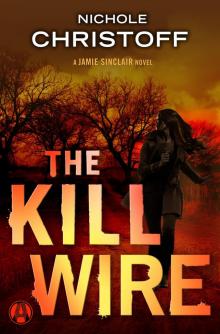 The Kill Wire
The Kill Wire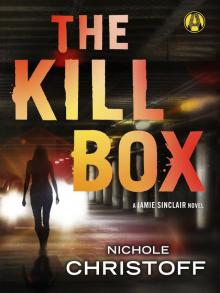 The Kill Box
The Kill Box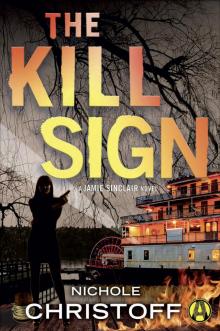 The Kill Radius
The Kill Radius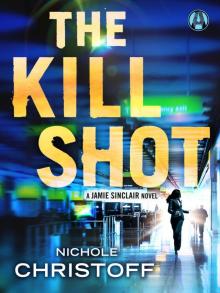 The Kill Shot
The Kill Shot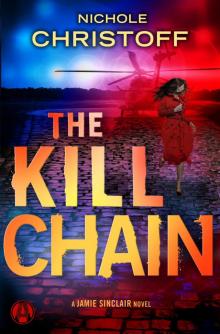 The Kill Chain
The Kill Chain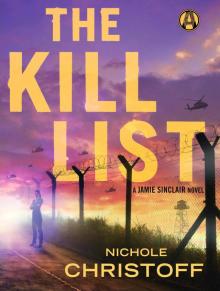 The Kill List
The Kill List